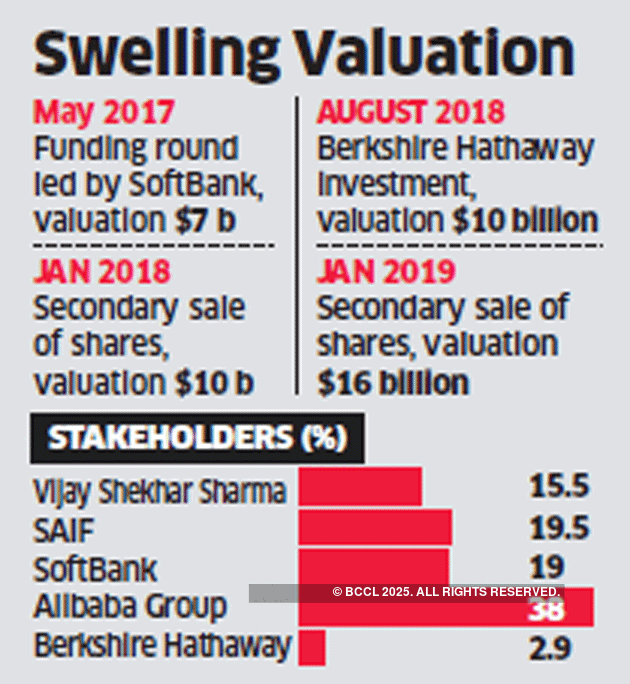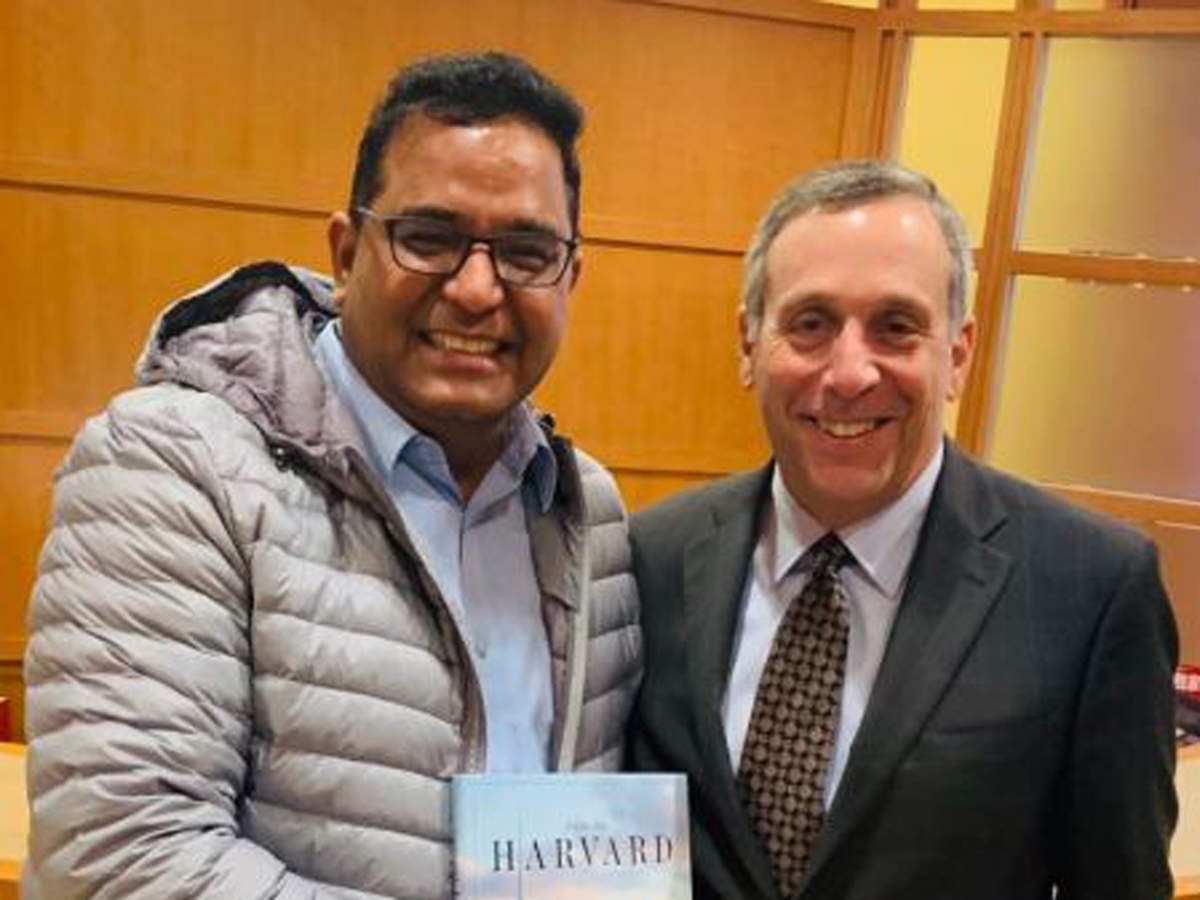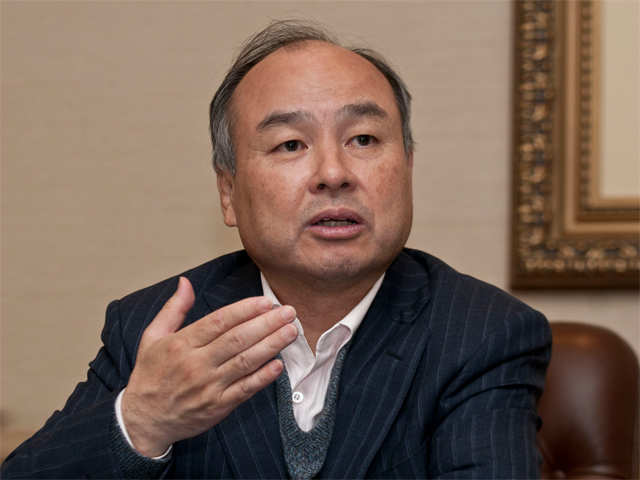Online payments services company Paytm is in the midst of raising $1.5-2 billion from existing investors SoftBank Vision Fund and Alibaba’s financial affiliate Ant Financial, said people with knowledge of the development.
The latest financing round at One97 Communications, the parent of Paytm, is likely to peg the company’s valuation at $16-18 billion, these people said, adding that new investors may join the current round.
Paytm is likely to see a significant spike in the $10 billion valuation ascribed to it when Warren Buffett-led Berkshire Hathaway invested $300 million last year. The company was valued at $16 billion in a secondary round a few months ago, said people aware of the matter.
A secondary sale is when an existing investor sells shares to a new one and the money does not come into the company's coffers.

Increasing Competition
“While SoftBank and Ant Financial’s capital is already in, the company is engaging with other investors and may look to take the round to as much as $2 billion. But it is most likely to be an internal round,” said one of the persons cited above.
SoftBank, which first invested in the company in 2017, holds a 19% stake. The Alibaba group, through Ant Financial and Alibaba directly, owns 38% of One97 Communications.
A SoftBank spokesperson said the company would not comment on speculation. Paytm founder Vijay Shekhar Sharma declined to comment.
Paytm needs capital to fend off competition from the payment units of global giants Google and Amazon besides local rivals such as Flipkart-owned PhonePe in a fast-growing digital payments market, which got a boost after demonetisation in late 2016. Paytm clocked more than 221 million transactions on the Unified Payments Interface (UPI) last month.
PhonePe and Google Pay are snapping at its heels, with transactions estimated at 180-190 million each. PhonePe is set to raise $1 billion after being hived off from Flipkart, ET reported on March 26, which will add to the competitive frenzy in a market that’s driven by freebies and cashbacks.
“The payments battle in India is a global one with deep-pocketed players in the fray and Paytm investors understand that if they don’t double down now they may lag behind. Currently Paytm has shown market leadership but the lead needs to be maintained, which is why the capital raise is important,” said an investor in the company requesting anonymity. According to this investor, Ant Financial, which runs Alipay, will value Paytm at least 20% higher than at the last funding round. Ant Financial’s oftdiscussed plans to go public are said to have been deferred for now but it needs to show growth in emerging markets, especially India, said the person cited above.
Cashbacks and subsidies have helped drive online payment transactions on the consumer side along with incentives to encourage adoption by merchants.
Paytm is looking to go beyond the payments business with a focus on new products such as Paytm Postpaid, its pay-later offering. It’s also floated Paytm Money, a platform for selling mutual funds, along with making a push in the travel and hotel booking space.
The latest fundraising effort comes as its struggling e-commerce business has been downsized substantially. Paytm Mall, a subsidiary of One97 Communications, is said to be in talks with eBay to get a fresh capital infusion at a lower valuation than in previous rounds.
The latest financing round at One97 Communications, the parent of Paytm, is likely to peg the company’s valuation at $16-18 billion, these people said, adding that new investors may join the current round.
Paytm is likely to see a significant spike in the $10 billion valuation ascribed to it when Warren Buffett-led Berkshire Hathaway invested $300 million last year. The company was valued at $16 billion in a secondary round a few months ago, said people aware of the matter.
A secondary sale is when an existing investor sells shares to a new one and the money does not come into the company's coffers.

Increasing Competition
“While SoftBank and Ant Financial’s capital is already in, the company is engaging with other investors and may look to take the round to as much as $2 billion. But it is most likely to be an internal round,” said one of the persons cited above.
SoftBank, which first invested in the company in 2017, holds a 19% stake. The Alibaba group, through Ant Financial and Alibaba directly, owns 38% of One97 Communications.
A SoftBank spokesperson said the company would not comment on speculation. Paytm founder Vijay Shekhar Sharma declined to comment.
Paytm needs capital to fend off competition from the payment units of global giants Google and Amazon besides local rivals such as Flipkart-owned PhonePe in a fast-growing digital payments market, which got a boost after demonetisation in late 2016. Paytm clocked more than 221 million transactions on the Unified Payments Interface (UPI) last month.
PhonePe and Google Pay are snapping at its heels, with transactions estimated at 180-190 million each. PhonePe is set to raise $1 billion after being hived off from Flipkart, ET reported on March 26, which will add to the competitive frenzy in a market that’s driven by freebies and cashbacks.
“The payments battle in India is a global one with deep-pocketed players in the fray and Paytm investors understand that if they don’t double down now they may lag behind. Currently Paytm has shown market leadership but the lead needs to be maintained, which is why the capital raise is important,” said an investor in the company requesting anonymity. According to this investor, Ant Financial, which runs Alipay, will value Paytm at least 20% higher than at the last funding round. Ant Financial’s oftdiscussed plans to go public are said to have been deferred for now but it needs to show growth in emerging markets, especially India, said the person cited above.
Cashbacks and subsidies have helped drive online payment transactions on the consumer side along with incentives to encourage adoption by merchants.
Paytm is looking to go beyond the payments business with a focus on new products such as Paytm Postpaid, its pay-later offering. It’s also floated Paytm Money, a platform for selling mutual funds, along with making a push in the travel and hotel booking space.
The latest fundraising effort comes as its struggling e-commerce business has been downsized substantially. Paytm Mall, a subsidiary of One97 Communications, is said to be in talks with eBay to get a fresh capital infusion at a lower valuation than in previous rounds.








